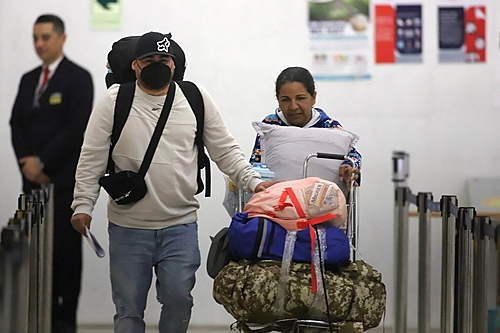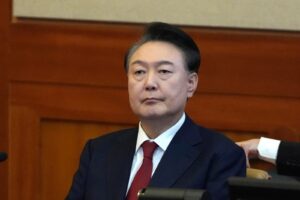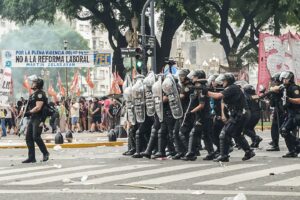
More than a hundred Venezuelan migrants were able to return to their country of origin after spending two weeks detained at the border between Chile and Peru due to bans imposed by the governments of Santiago and Lima. Last Sunday (7), a plane provided by Venezuela landed at Simón Bolívar International Airport, which serves Caracas, bringing 115 citizens who wanted to return after migrating due to the economic crisis.
The episode, which was only resolved when Santiago accepted the arrival of the humanitarian flight sent by Caracas, acquired tension after the Chilean and Peruvian governments militarized both sides of the border and forced migrants to remain homeless in the Chilean city of Arica for two weeks. , which borders the southern Peruvian province of Tacna.
The group, which included more than 200 migrants, including Venezuelans, Colombians, Haitians and Salvadorans, was trying to cross Peruvian territory to return to their countries of origin. The influx originated in recent weeks, after the government of Chilean President Gabriel Boric tightened anti-migration rules, aimed mainly at Venezuelans who arrive daily in the country through the northern border with Bolivia.
In early March, shortly after decreeing the militarization of provinces and cities bordering Bolivia and Peru, Boric adopted a conservative tone against migrants and stated that the inhabitants of these regions had to “experience the effects of the massive and irregular influx of people who come to our country looking for opportunities”.
“Some of them also come with intentions to commit crimes and I want to be very clear when I say that these people who come to commit crimes are not welcome. We will pursue them and we will make, within the rule of law, their life impossible. “, he said.
:: What’s happening in Venezuela ::
The Chilean president also accused the governments of Venezuela and Bolivia of not assisting in the deportation of Venezuelan migrants from Chilean territory, claiming that both would refuse to receive these people.
The Bolivian government responded to Boric, saying that between the two countries “there is no agreement, agreement or bilateral instrument that generates such an obligation” and that the migration issue should be “addressed with the migration authorities of origin, avoiding the negative stigmatization of the migrant and any action that may violate human rights”.
Caracas, in turn, responded through its foreign minister, Yván Gil, who clarified that Venezuela had not received “any request for coordinated work with the government of Chile regarding alleged deportations of Venezuelans.”
The restrictions imposed by Chile encouraged an opposite flow of migrants. When trying to leave the country, they encountered other prohibitions, this time by the Peruvian government. Following the example of Chile, President Dina Boluarte militarized the south of the province of Tacna, on the border with Chile, and denied passage to migrants who had any irregularities in their documents.
:: US changes rules and limits entry of Venezuelans; Motivation is political, says expert
Furthermore, like Boric, Boluarte adopted a hostile discourse against migration and, at the end of April, when he announced a state of emergency at the borders, he even attributed an increase in crime rates to the arrival of Venezuelans and Haitians in the country. “Those who commit robberies and other crimes on a daily basis are foreigners. 800,000 Venezuelans entered, as many Haitians, and they are the ones committing these acts,” he said.
Human rights and politicization
In an interview with Brazil in FactVenezuelan researcher Ana Gabriela Salazar, from the human rights NGO Sures, expressed concern about the actions taken by the governments of Chile and Peru and said that countries should convene multilateral meetings with Venezuela to seek joint solutions.
“Our concern is with the tendency of countries to implement increasingly repressive, increasingly expulsion policies and to approve national norms, at the internal level of each country, which are punitive and criminalize migrants, applying more and more border control mechanisms and migration using the Armed Forces,” he said.
Salazar also claims that, despite the internal policies of each country, they should respect the rules on migration recommended by the United Nations and the Inter-American Human Rights System, to which Chile and Peru are signatories.
:: Summit in Colombia attracts US and EU, but immediate sanctions relief on Venezuela unlikely ::
“For this to happen, it is necessary to de-ideologize this issue and that legitimately elected governments are recognized so that plans and programs are effective and applied, such as, for example, the Volta à Pátria Plan, which faces restrictions in some cases where there is politicization of regional intergovernmental spaces that place obstacles to the care of migrants”, he says.
The Volta à Patria Plan was created by the Venezuelan government in 2018 as an emergency method to address the Venezuelan migration crisis in neighboring countries. Through the program, Venezuela offers humanitarian repatriation flights to any and all Venezuelan migrants who express a desire to return to their country of origin.
The program, however, faces several political and diplomatic obstacles that, many times, are consequences of the almost unanimous recognition in Latin America of the “interim government” of Juan Guaidó. With the self-proclamation of the former deputy in 2019, many neighboring countries began to only dialogue with opposing forces and cut official diplomatic channels with the government of President Nicolás Maduro, which included the closure of embassies and consular offices. The absence of these services in many South American countries still makes it difficult for Caracas to maintain an open channel with migrants abroad and to know, for example, how many want to return.
:: How does the blockade relate to suspicions of corruption at Venezuela’s state-owned oil company ::
In addition, the sanctions imposed by the US against Venezuela also negatively impact the execution of humanitarian flights. In most cases, the Volta à Patria program is carried out with planes from the state-owned Venezuelan airline Conviasa. In many countries the company cannot operate because other companies and service providers refuse to supply or receive these planes for fear of being sanctioned by Washington.
“The suffering, the inhuman conditions, the precarious situation these people were subjected to is very worrying, because it demonstrates an indifference to the human condition. There are children, pregnant women or women who have just given birth, the elderly, that is, sectors of population that are already extremely vulnerable”, argues Salazar.
Xenophobia serves internal agendas
The economic crisis in Venezuela, aggravated by the blockade imposed by the US, has motivated many Venezuelans to migrate. According to UN data, more than 5 million people have left the country since 2014, when the recession began. The migratory flow increased considerably after 2017, when Washington tightened its sanctions policy and attacked the Venezuelan oil industry, the country’s main source of resources.
During the years of greater migratory intensity, countries neighboring Venezuela were governed by right-wing presidents who supported the strategy of “maximum pressure” against Maduro elaborated by the White House. For Andrés Antillano, professor of law at the Central University of Venezuela (UCV), it was during this period that Venezuelan migration became politicized and used as “proof of the political failure of left-wing alternatives”.
:: The impact of the US blockade against Venezuela is more serious among women ::
“The neighboring countries, then, opened their doors to Venezuelan migration, not out of solidarity, but as a political instrument to criminalize Venezuela and prove the failure of the Venezuelan political model”, says Antillano, in an interview with Brazil in Fact.
In the case of migrants stranded on the border of Chile and Peru, the professor points to the weaknesses of the Boric government which, according to him, was pressured to adopt a more conservative stance in order to try to win votes from the extreme right in the elections for the new constituent assembly. . For him, such a posture ended up affecting Venezuelan migrants.
“The center of the campaign for the constituent in Chile was security and migration, in which a left-wing government allowed the right to impose a xenophobic and security agenda, from a clearly reactionary perspective, the results of which were evident last Sunday. In the case of Peru, a little legitimate government that is up against the wall due to popular protests, which manages, or at least tries, to exchange the problem of the political crisis and the legitimacy of the government of Dina Boluarte for the danger of Venezuelan migration”, he explains .
Antillano further states that “on both sides, the danger of Venezuelan migration, xenophobia and the tightening of policies against Venezuelan migration served domestic political agendas”.
Editing: Thalita Pires
Source: www.brasildefato.com.br

